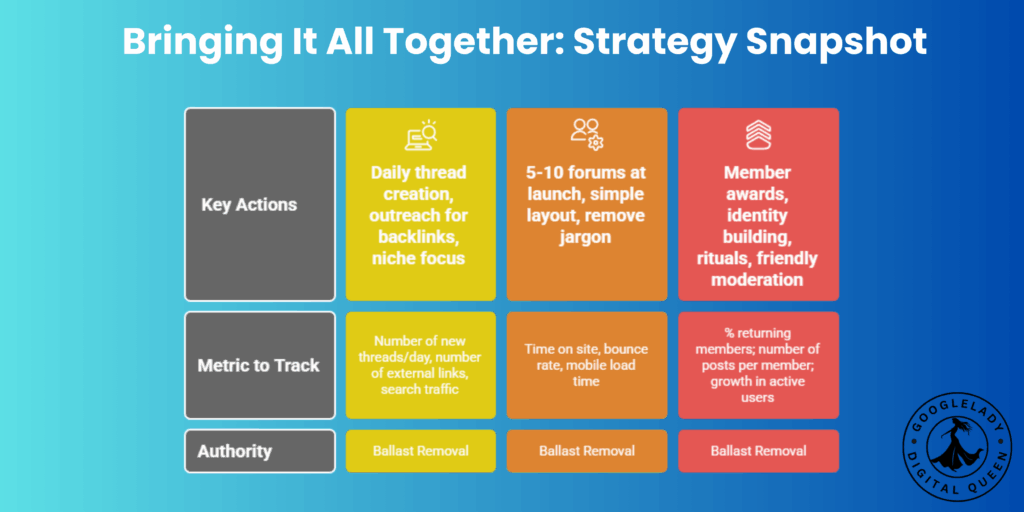The ABC of Building a Successful Forum
Creating a vibrant, active forum isn’t just about installing software and letting people loose. To build a forum that sustains itself, attracts new members, and becomes known as the place to go in your niche, you need a clear strategy. Below is a refined, detailed version of your article—rewritten in a human tone, enriched with key statistics and examples, using relevant semantic SEO keywords like "forum growth," "community engagement," "niche discussion board," "online forum authority," "forum design best practices," and "member retention"—without overstuffing.
A is for Authority—Become the Go-To Forum in Your Niche
When you launch a forum, your goal should be to become recognized as the authority in your niche. Think of it as the first place people want to visit when they’re looking for discussions, information, debates, or connections around your subject.
Why this matters
- According to recent data, online communities achieve engagement rates of 40%-50%, far higher than many social platforms.
- The global community forum market is growing strongly (CAGR ~11-12%), which underscores the relevance of well-managed forums.
- If your forum becomes the “authority hub,” you benefit from search engine visibility, backlinks, and word-of-mouth referrals.
How to build authority
Here are concrete steps:
- Drive discussions proactively. Schedule your team to start one or two new threads each day. Engage in existing threads to keep them alive. For example: if someone posted a question that went quiet, bring it back with a new angle or update.
- Bring back “old” threads. Threads that have fallen off Page 1 might still contain valuable insights, reignite them with fresh commentary, ask for updates, or challenge assumptions.
- Focus on niche depth. It’s often more effective to dominate a narrower niche than to be one among many in a broad category. E.g., creating the best forum for “Classical Music Discussion” may be easier and more credible than trying to cover all music genres.
- Earn links and SEO traction. Reach out to related websites and blogs, and invite them to link to your best discussion threads (especially when you host interviews or expert content). This builds your backlink profile and improves search engine ranking.
- Feature expert content. For example, interviewing a well-known figure in your niche encourages bloggers and forum posters to link back to your site, which further boosts your authority.
- Consistency is key. Authority doesn't happen overnight; regular content, steady engagement, and helpful discussions build reputation over time.
Example / Case in point
Consider a forum about fishkeeping. Instead of launching 20 subforums for each species instantly, you might start one for “Freshwater Fish” and one for “Tropical Fish.” Your team posts expert threads like “How to Care for Koi in Small Ponds,” “Cycling vs Instant Stocking: Debate,” etc. You link externally by asking Koi to reference your discussions. Over weeks, you become the hub for koi and pond hobbyists.
B is for Ballast Removal—Keep the Forum Design Lean & Member-Friendly
“Ballast” here means anything that weighs down the user experience: over-complex layouts, jargon, too many subforums, or features that confuse new users. A clean, clear, simple structure helps new visitors convert into members and posters.
Why this matters
- Forums with many subforums often dilute activity. Users prefer fewer, more interesting threads rather than jumping between dozens of nearly empty boards.
- Mobile usage is rising: reports show that over 60% of community forum traffic now comes from mobile devices.
- A slow-loading page or confusing UI discourages participation.
- According to one guide, new forum users with “jargon-free” interfaces and clear labels have higher engagement.
Best practices for design & structure
- Start small. On launch, limit your forum to at most 10 broad forums. Group related topics, e.g., in a fishkeeping forum: “Freshwater Fish,” “Tropical Fish,” “Aquarium Equipment & Setup,” “Help & Troubleshooting,” and “Member Showcase.”
- Resize later only when needed. Once a forum grows busy and threads start to bury quickly, split it into two smaller ones. This ensures each board remains active and visible.
- Avoid heavy skins or unnecessary graphics. Rich visuals may look good but slow down load times and distract from content. A clean, fast-loading theme fosters participation.
- Eliminate confusing terminology. Use everyday language: e.g., “Control Panel” instead of “User CP” and “Streamlined Version” instead of “Lo-Fi.” If you use newcomer jargon, provide a “Newbie Guide.”
- Remove unused features. If statistics like “member number” or “views count” don’t add value or confuse newcomers, hide or remove them. Focus your UI on “Sign Up,” “Start a Thread,” and “Join the Conversation.”
- Ensure mobile responsiveness. A large share of visitors will access via phones ensure your forum works well on smaller screens.
- Make navigation intuitive. Users should easily find “New Posts,” “Popular Threads,” “Help,” and your forum rules. Clarity supports higher retention and member conversion.
Example
In our fishkeeping forum scenario, you initially lump all freshwater topics under one board, rather than separate “Carp” and “Tetras” at launch. You choose a minimalist, fast theme. You rename “User CP” to “My Profile & Settings.” After 6 months of activity, you notice many posts about Koi—you then spin off a new board, “Koi & Pond Fish,” to accommodate that focus.
C is for Community—Make Members Feel They Belong
Ultimately, what transforms a visitor into a regular forum member is the sense of belonging—of being part of something bigger, of being recognized, of forming connections. Without that emotional investment, even solid content and structure will struggle to retain members.
Why community matters
- Engagement thrives when members feel visible, valued, and connected.
- Statistics indicate that online community members report a 98% sense of belonging when their forum is well-managed.
- In communities, regular posters (“superusers”) often produce the bulk of content. Recognizing them helps maintain momentum.
- A sense of identity (within a community) significantly raises the likelihood of return visits and retention.
How to foster community
- Encourage member identity. When someone posts something good, recognize it: “Great insight, Professor!” or “Thanks for that joke, @Joker!” This builds recognition.
- Award ceremonies. Monthly awards like “Best Debater,” “Top Helper,” and “Ace Picture Poster” help motivate members and celebrate participation.
- Promote member interaction beyond niche topics. Create threads for “Introductions,” “Your Other Hobbies,” “Weekend Chat,” etc. When members know each other, they feel part of a community.
- Feature member-generated content. Allow members to host Q&A sessions and photo case studies of their own projects. This brightens the spotlight on them, not just on you (the site owner).
- Moderation with empathy. Set clear guidelines, but also foster a friendly environment. A member who feels “heard” and valued is far more likely to engage long-term.
- Create rituals. For example: a weekly “Friday Fun Fact” thread, a monthly live chat, or a seasonal challenge. Rituals help embed habits.
- Make newcomers feel welcome. A special welcome thread, automated greetings, or a “First Timer” badge help a new user feel integrated. Even simple “Welcome @Name— tell us where you’re from” posts help.
- Use member segmentation sensibly. Recognize your superusers (top posters) and consider giving them extra privileges (e.g., a “Community Ambassador” badge). Their leadership helps keep discussions alive.
Example
Imagine your fishkeeping forum introduces a monthly “Member Spotlight” where one active member writes a short article about their aquarium setup and posts pictures. That person is celebrated, gains visibility, and others aspire to be featured. Meanwhile, you run a thread called “Weekend fish snapshot” where all members share a picture—the sense of shared hobby and identity grows.
Bringing It All Together: Strategy Snapshot

Suggested Timeline (First 90 Days)
- Days 1-30: Set up board structure (max 10), install a clean prepare a “Newbie Guide.” The team creates 1-2 threads per day. Reach out to 3-5 related sites for linking opportunities.
- Days 31-60: Launch community rituals (welcome thread, weekend snapshot). Introduce “Member of the Month.” Monitor which topics gain traction; plan splits if one board is too busy.
- Days 61-90: Evaluate performance metrics (return rate, posts per day). Optimize navigation, and remove or hide low-value features. Continue backlink outreach and consider a guest expert interview to boost authority.
Bonus: Why Niche Matters & How to Expand Later
Starting with a narrow niche gives you a manageable scope, user base, and clearer positioning in search engines. Once you dominate that niche and have an active community, then you can consider branching out into adjacent topics. But expansion should be gradual and always driven by user demand (i.e., if you observe many threads about a new topic, then create a dedicated board).
The global forum market forecasts show strong growth, meaning there’s room for new communities—but only if you do the foundational work first.
Final Thoughts
Building a successful forum is a mix of strategy, discipline, and humanity.
- You build authority by being proactive and focused.
- You remove ballast by keeping things simple, clear, and fast.
- You cultivate community by making people feel seen, valued, and connected.
If you do all three, your forum becomes not just a “board” where people post, but a destination where members stay, engage, and return. Over time, that becomes self-reinforcing: more members → more content → greater authority → more members.



0 Comments